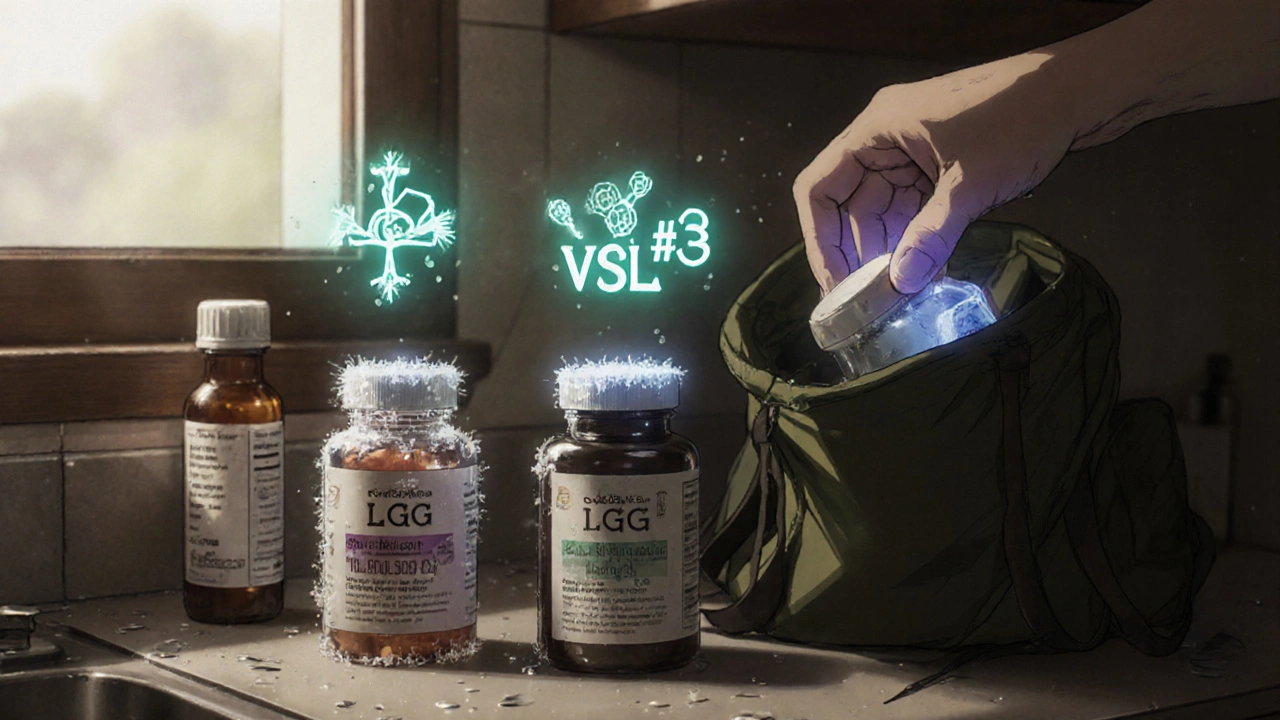Probiotics and Gut Health: What the Science Says About Digestive Supplements

When you hear the word probiotics, you might think of yogurt commercials or a shelf full of pills at the pharmacy. But what do they actually do? And does the science back up the claims? If you’ve ever dealt with bloating after antibiotics, constant gas, or diarrhea that won’t quit, you’ve probably wondered if probiotics are worth the money. The truth isn’t simple. Some people swear by them. Others feel nothing. The real answer lies in the details - the specific strains, the doses, and the condition you’re trying to fix.
What Exactly Are Probiotics?
Probiotics aren’t just any good bacteria. They’re live microorganisms - like certain types of bacteria and yeast - that, when taken in the right amount, can help your gut stay balanced. The International Scientific Association for Probiotics and Prebiotics (ISAPP) defines them clearly: they must provide a health benefit. That’s not marketing. That’s science.
Back in the early 1900s, Russian scientist Élie Metchnikoff noticed Bulgarian villagers who ate fermented milk lived longer. He guessed it was the lactic acid bacteria in their yogurt. Today, we know more. Your gut holds about 100 trillion microbes from over 1,000 species. Most of them are harmless or even helpful. Probiotics aim to support this complex ecosystem, not replace it.
When Do Probiotics Actually Work?
Not all probiotics work for everything. This is where most people get confused. You can’t just buy any bottle and expect it to fix your digestion. The evidence is clear: certain strains help with specific problems.
For acute infectious diarrhea - especially in kids - probiotics like Lactobacillus rhamnosus GG (LGG) and Saccharomyces boulardii have strong backing. A 2020 Cochrane Review of over 12,000 children showed these strains cut the risk of diarrhea lasting more than 48 hours by 36%. That’s not small. In one study, kids taking LGG recovered about a day faster than those who didn’t.
For antibiotic-associated diarrhea (AAD), the data is even stronger. Antibiotics wipe out good and bad bacteria. That’s why so many people get diarrhea after a course. Taking probiotics - specifically LGG at doses of 10 billion CFU or more - can reduce AAD risk from 22% down to 12%. The key? Take them at least two hours apart from your antibiotic, and keep going for a week or two after you finish the pills.
For ulcerative colitis, a form of inflammatory bowel disease, some probiotics like VSL#3 (a mix of strains) have shown modest benefits in keeping symptoms in check. But for Crohn’s disease? Almost no benefit. The American Gastroenterological Association says probiotics aren’t recommended for Crohn’s or for acute pouchitis.
What About IBS and Bloating?
This is where things get messy. Many people buy probiotics hoping to ease IBS symptoms - bloating, cramps, irregular bowel movements. And some do feel better. But the science doesn’t give a clear green light.
A 2013 study found that people with IBS who took a drink with Lactobacillus plantarum DSM 9843 had less pain and gas after four weeks. Their gut microbes also became more stable. But other studies show mixed results. One strain might help one person. Another strain might do nothing for someone else. There’s no universal probiotic for IBS.
That’s because your gut microbiome is as unique as your fingerprint. What works for your neighbor might not work for you. The Mayo Clinic puts it plainly: probiotics aren’t a one-size-fits-all solution.

Not All Probiotics Are Created Equal
Here’s the big secret: Lactobacillus acidophilus isn’t one thing. It’s dozens of different strains - LA-1, LA-5, NCFM, DDS-1, SBT-2026 - and each behaves differently. Just because a product says “contains L. acidophilus” doesn’t mean it’s the same as another product with the same name.
Effective doses matter too. For LGG to work against diarrhea, you need at least 10 billion CFU per day. Some cheap supplements contain less than 1 billion - barely enough to make a difference. And not all strains survive stomach acid. That’s why some brands use special coatings or encapsulation.
Storage is another issue. Some probiotics, like VSL#3, need refrigeration. Others, like Saccharomyces boulardii, are shelf-stable. If you leave a refrigerated probiotic on your counter for a month, most of the live cultures may be dead by the time you take it.
What to Look for When Buying Probiotics
With over 400 products on the market, how do you pick? Here’s what actually matters:
- Strain name: Look for the full scientific name - like Lactobacillus rhamnosus GG, not just “Lactobacillus.”
- CFU count: At least 1 billion to 10 billion colony-forming units per dose for most uses. Higher isn’t always better, but too low won’t help.
- Research-backed: Does the brand cite studies on that exact strain for your condition? If not, be skeptical.
- Third-party verification: Look for seals from USP, NSF International, or ConsumerLab. A 2019 test found 30% of probiotics had fewer live organisms than labeled.
- Expiration date: Probiotics lose potency over time. Buy fresh.
Brands like Culturelle (which contains LGG) have high ratings on Amazon and solid clinical backing. Others, like Garden of Life, have good reviews too, but less consistent strain-specific data. Don’t just pick the cheapest or the one with the prettiest packaging.
Side Effects and Risks
Most healthy people can take probiotics without issues. But some notice mild side effects in the first few days: gas, bloating, or stomach cramps. These usually fade as your gut adjusts - often within a week. The Cleveland Clinic says this is normal.
But there’s a risk for certain people. If you’re severely ill, immunocompromised, or have a central line, probiotics can rarely cause infections. There are case reports of bacteremia from probiotic strains in very sick patients. That’s why doctors don’t recommend them for ICU patients or those with weakened immune systems.
And here’s a twist: some research suggests probiotics might delay gut microbiome recovery after antibiotics. One 2018 study found people who took probiotics after antibiotics had slower restoration of their natural gut bacteria than those who didn’t. So even when they help with diarrhea, they might not be helping your long-term balance.

What the Experts Say
Dr. Mary Ellen Sanders of ISAPP says: “Different strains have different effects.” That’s the core message. You wouldn’t take an antibiotic for a virus. Don’t take a probiotic for the wrong problem.
The European Food Safety Authority (EFSA) has rejected health claims for almost all probiotics - except for yogurt cultures that help with lactose digestion. The U.S. FDA doesn’t allow general claims like “supports gut health” unless a specific strain is proven for a specific disease. That’s why you won’t see “cures IBS” on a bottle - because it’s not proven.
Yet, 74% of users in a 2022 survey said they felt better after taking probiotics. That’s a lot. But correlation isn’t causation. Placebo effect? Possibly. Real benefit? Sometimes. It depends on the person and the product.
Where Is This All Going?
The probiotic market is booming - $50 billion in 2022, and it’s projected to hit $89 billion by 2030. But the future isn’t in random pills. It’s in personalization.
Companies like Viome and Thryve now offer gut microbiome tests and then recommend custom probiotic blends based on your unique bacteria profile. Early results are promising, but large-scale studies are still underway.
Researchers are also looking at probiotics for metabolic health - weight, blood sugar, even mood. One 2024 study found certain strains influenced insulin sensitivity. But this is early-stage science. Don’t expect probiotics to replace metformin or diet changes yet.
For now, the clearest wins are still infectious diarrhea in children and antibiotic-related diarrhea in adults. Everything else? Use with caution. Know your strain. Know your dose. Know your goal.
Final Takeaway
Probiotics aren’t magic. They’re not useless. They’re tools - and like any tool, they only work if you use the right one for the right job. If you’re on antibiotics, a strain like LGG might save you from days of diarrhea. If you have IBS and bloating, try one strain for 4-8 weeks and track your symptoms. If nothing changes, stop. Don’t waste money on a bottle that doesn’t work for you.
The best probiotic is the one backed by science for your specific issue - not the one with the most stars on Amazon or the flashiest label. Your gut isn’t a one-size-fits-all system. Neither should your supplement be.
Do probiotics help with constipation?
Some strains, like Bifidobacterium lactis and Lactobacillus acidophilus NCFM, have shown modest improvement in constipation in clinical trials, especially in people with slow transit time. But results vary. If you’re chronically constipated, probiotics alone won’t fix it - fiber, water, and movement matter more.
Can you take probiotics every day?
Yes, for most healthy people, daily use is safe. But you don’t need to take them forever. If you’re using them to prevent antibiotic diarrhea, stop after you’ve finished the course. If you’re using them for IBS, try them for 6-8 weeks. If you feel better, keep going. If not, stop. There’s no evidence that long-term daily use offers extra benefits for healthy people.
Are fermented foods better than probiotic supplements?
Fermented foods like yogurt, kefir, sauerkraut, and kimchi contain live cultures and other nutrients. They’re great for overall gut health and don’t require pills. But they don’t always contain the high, targeted doses of specific strains you need to treat a condition like antibiotic diarrhea. Supplements are more reliable for therapeutic use. Food is better for daily maintenance.
Do probiotics help with weight loss?
Some animal and early human studies suggest certain strains may influence metabolism or fat storage, but there’s no solid proof that taking probiotics leads to weight loss in humans. Don’t buy a probiotic hoping to lose weight. Diet, sleep, and exercise still matter far more.
How long does it take for probiotics to work?
For acute issues like antibiotic diarrhea, you might notice improvement in 2-3 days. For chronic issues like IBS or bloating, it can take 2-8 weeks. Most people don’t give it enough time. Don’t quit after a week. Wait at least 4 weeks before deciding if it’s working.
Can kids take probiotics?
Yes, and they often respond better than adults. Strains like LGG and Saccharomyces boulardii are well-studied in children for diarrhea and are generally safe. Always check the label for age-appropriate dosing. For infants, consult a pediatrician before starting.

Emily Craig
November 25, 2025 AT 03:59So I took probiotics for a month because my friend said they fixed her IBS and now I just feel like a human who swallowed a tiny disco ball
Karen Willie
November 26, 2025 AT 02:23I’ve been taking Culturelle daily since my last round of antibiotics and honestly? No more bloating. Not magic, but it works for me. Just find what fits your gut - everyone’s different.
Shivam Goel
November 27, 2025 AT 12:59Let’s be precise: Lactobacillus rhamnosus GG at ≥10^10 CFU/day demonstrates statistically significant reduction in duration of acute infectious diarrhea (p<0.001, 95% CI: 0.52–0.74), per Cochrane 2020 meta-analysis. Meanwhile, commercial products often contain <10^9 CFU, rendering them biologically inert. Additionally, 30% of supplements fail CFU labeling per 2019 ConsumerLab audit. Therefore, most probiotic purchases are placebo-driven expenditures with negligible microbiological impact.
Amy Hutchinson
November 27, 2025 AT 22:36Wait so you’re telling me I wasted $40 on that Amazon probiotic with the cute bear on the bottle??
Archana Jha
November 29, 2025 AT 21:58Probiotics are a big pharma scam to make you buy pills instead of eating real food like your ancestors did. They don’t want you to know that the government is secretly testing gut bacteria in the water supply to control our emotions. Also, I read on a forum that probiotics cause autism in mice so obviously they’re dangerous. I stopped taking mine and now my dreams are clearer.
Aki Jones
December 1, 2025 AT 07:20Let’s not ignore the elephant in the room: the placebo effect is being weaponized by supplement companies. You feel better? That’s your brain being manipulated by branding. And yet, you’re still buying it. Why? Because you’re emotionally attached to the idea of ‘fixing’ yourself. You’re not healing - you’re performing wellness. And the worst part? You think you’re being proactive.
Andrew McAfee
December 2, 2025 AT 03:33In Nigeria we ferment pap and ogi for weeks - no pills needed. My grandma’s gut was better than any lab-bred strain. Probiotics are just Western overcomplication. Real food doesn’t need a label with a barcode.
Andrew Camacho
December 2, 2025 AT 03:55Okay but have you even READ the fine print? Most probiotics are dead by the time they hit your shelf. And don’t even get me started on the fact that some companies use ‘live cultures’ as a marketing gimmick while their product is basically sugar-coated chalk. I’ve seen it. I’ve tested it. I’ve cried over my $60 bottle of disappointment. This isn’t science - it’s a cult.
Patricia McElhinney
December 3, 2025 AT 08:20It is imperative to underscore that the absence of FDA approval for general gut health claims renders all consumer-facing probiotic marketing inherently misleading. Furthermore, the prevalence of typographical errors on product labels - e.g., ‘Lactobacilus’ instead of ‘Lactobacillus’ - indicates a systemic disregard for scientific rigor. One cannot trust a product whose packaging betrays its own legitimacy.
Dolapo Eniola
December 5, 2025 AT 02:57Probiotics? Nah. In Nigeria we just drink fermented milk with pepper and call it a day. You think you need pills? Bro, your gut is weak because you eat too much processed food. Stop blaming science. Fix your diet. Also 🤡
Agastya Shukla
December 5, 2025 AT 20:41Interesting. I’ve been tracking my stool consistency and gas frequency for 6 weeks after switching from a generic probiotic to a strain-specific L. plantarum DSM 9843. The reduction in bloating was measurable - about 40% improvement. But I only noticed it after 3 weeks. Patience matters. Also, prebiotic fiber made a bigger difference than the probiotic itself.
Pallab Dasgupta
December 5, 2025 AT 21:13Bro I took probiotics after antibiotics and my gut went from ‘oh god why am I crying in the bathroom’ to ‘I can eat tacos again’ in like 3 days. I don’t care if it’s placebo or science - it worked. I’m not overthinking it. I’m just grateful. Also I’m gonna buy another bottle because I’m not risking that again. 🙏
Ellen Sales
December 6, 2025 AT 17:34It’s funny how we treat our guts like broken machines that need fixing - when really, they’re living ecosystems. Maybe the real question isn’t ‘which probiotic?’ but ‘what am I doing to harm my microbiome?’ I stopped eating sugar, started sleeping, and now I don’t need pills. Sometimes the best supplement is just… silence. And a walk outside.
Josh Zubkoff
December 7, 2025 AT 14:42Let’s be real - the entire probiotic industry is built on the idea that we’re broken and need to buy our way back to health. And it’s working. People are spending billions on tiny bacteria because they’re scared of their own digestion. But here’s the truth: your gut doesn’t need a pill. It needs less stress, less sugar, less processed crap, and more time to breathe. You don’t need to ‘supplement’ your microbiome. You need to stop annihilating it. And yet - you’ll keep buying the bottle with the pretty label because it makes you feel like you’re doing something. You’re not. You’re just feeding the machine. And the machine? It’s laughing.